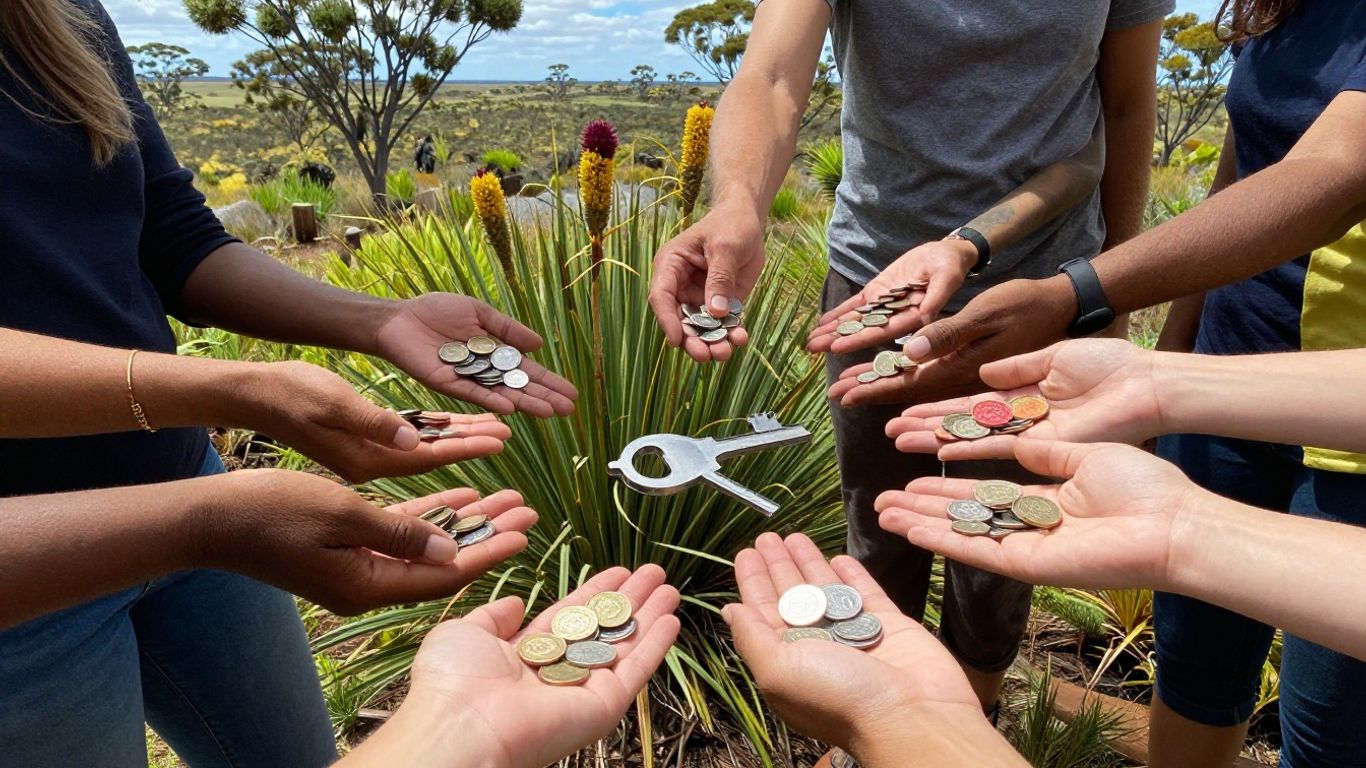As we step into 2025, many of us are looking for ways to save money and live a more thrifty lifestyle. With prices on the rise, finding clever strategies to cut costs without sacrificing quality is more important than ever. Whether you’re just starting out on your savings journey or you’re a seasoned pro at frugal living, these top 10 brilliant money saving tips can help you stretch your budget further and enjoy life without breaking the bank.
Key Takeaways
- Utilise budgeting apps to track your spending and set financial goals.
- Meal prep with reusable containers to save money and reduce food waste.
- Shop at secondhand stores for unique finds and significant savings.
- Make your own cleaning products to cut costs and reduce chemicals in your home.
- Take advantage of free resources like local libraries and community courses.
1. Budgeting Apps
Okay, so first up on our thrifty list for 2025: budgeting apps. I know, I know, it sounds boring, but trust me, these little things can be lifesavers. I used to just wing it with my spending, and let’s just say my bank account wasn’t exactly thrilled. But then I started using a budgeting app, and it was like someone turned on the lights.
Budgeting apps help you track where your money is going. It’s like having a financial personal assistant in your pocket, except way cheaper (most have free versions!).
Here’s why I reckon they’re so good:
- They show you exactly where your money disappears to each month. You might be surprised at how much you’re spending on coffees or those sneaky online shopping trips.
- You can set budgets for different categories, like groceries, transport, and entertainment. This stops you from overspending without even realising it.
- Many apps link directly to your bank accounts, so you don’t have to manually enter every transaction. Talk about convenient!
I remember one month, I thought I was doing pretty well with my spending. Then I checked my budgeting app, and it turned out I’d spent a ridiculous amount on takeaway food. It was a real eye-opener, and I started cooking at home more. Saved a heap of cash!
There are heaps of different budgeting apps out there, so it’s worth having a look around to find one that suits you. Some popular ones in Australia include Money Brilliant, Pocketbook, and YNAB. Have a look at the top budgeting apps to find the best one for you. Give one a go – you might be surprised at how much easier it makes managing your money. Plus, more money in your pocket means more for fun stuff, right?
2. Meal Prep Containers

Okay, so meal prep containers might seem like a no-brainer, but trust me, they’re a game-changer. I used to just chuck leftovers in whatever random container I could find, which usually meant a mismatched collection of old takeaway tubs. But investing in a decent set of food-storage containers has seriously helped me cut down on food waste and save money.
Having pre-portioned meals ready to go stops me from ordering takeaway when I’m too tired to cook. Plus, it’s way healthier than grabbing something processed from the shops. I reckon I save at least $50 a week just by not impulse buying lunch every day.
I’ve found that glass containers are the best because they don’t stain or absorb smells like plastic ones can. They’re also microwave and oven-safe, which is super handy. But if you’re on a tight budget, even a set of cheap plastic containers is better than nothing. You can even reuse old margarine tubs or takeaway containers – just give them a good wash first!
Seriously, get yourself some meal prep containers. It’s a small investment that pays off big time in terms of both your wallet and your health. You can even write a menu plan to help you cut down on food waste.
Here’s a few things I like to keep in mind when I’m prepping my meals for the week:
- Make a list before you go shopping so you only buy what you need.
- Cook in bulk – roast a whole chicken, make a big pot of soup, or bake a tray of lasagne.
- Portion everything out into individual containers as soon as it’s cooled down.
- Label your containers with the date so you know when they need to be eaten by.
3. Secondhand Stores
Secondhand stores are goldmines for thrifty Aussies! You can find just about anything at a fraction of the retail price. From clothing and furniture to books and kitchenware, it’s worth checking out your local op shops before buying new. Shopping secondhand is not only good for your wallet but also for the environment.
Here’s why you should embrace the pre-loved life:
- Save heaps of dosh: Seriously, the savings can be massive. You can often find quality items for 50-90% less than their original price.
- Reduce waste: Buying secondhand gives items a new life, preventing them from ending up in landfill. It’s a sustainable choice that helps the planet.
- Find unique treasures: You never know what you might discover in a secondhand store. You can find vintage clothing, antique furniture, and other one-of-a-kind items that you won’t find anywhere else.
I’ve kitted out my entire apartment with secondhand furniture. It’s saved me thousands, and I love the quirky, eclectic vibe. Plus, I feel good knowing I’m doing my bit for the environment.
Consider upcycling unwanted furniture. Before you chuck out that old chest of drawers, think about giving it a fresh coat of paint. You might even be able to sell it for a profit!
Don’t forget about online marketplaces like Facebook Marketplace or Gumtree. You can often find even better deals and a wider selection of items than in brick-and-mortar stores. Just be sure to inspect items carefully before buying and meet in a safe, public place. Also, consider frugal living tips to help you save money and live a more sustainable lifestyle.
4. DIY Cleaning Products
Alright, let’s talk about ditching those expensive, chemical-laden cleaning products and getting a bit crafty. Honestly, I used to think making my own stuff was way too much effort, but now I’m a total convert. It’s cheaper, better for the environment, and you actually know what’s going into your homemade cleaning sprays. Plus, there’s a certain satisfaction in knowing you’re not just chucking money down the drain.
The best part is that you probably already have most of the ingredients you need sitting in your pantry.
Here’s the deal:
- Vinegar is your new best mate. It’s a fantastic disinfectant and cuts through grease like a hot knife through butter. Just don’t use it on marble – trust me on this one.
- Baking soda is another superstar. It’s great for scrubbing, deodorising, and generally making things sparkly. I use it in the kitchen and bathroom all the time.
- Essential oils aren’t just for making your house smell nice (although they do that too!). Some, like tea tree and eucalyptus, have antibacterial properties. Plus, they make cleaning a bit more enjoyable.
I started making my own cleaning products a few months ago, and I’ve saved a surprising amount of money. Plus, I feel better knowing I’m not spraying harsh chemicals all over my house. It’s a win-win!
If you’re looking to save more money and prevent clutter, this is a great way to start. You can even use old t-shirts as rags instead of buying paper towels. It’s all about being resourceful!
5. Energy-Efficient Appliances
Okay, so this one might seem like a bit of an upfront cost, but trust me, it pays off in the long run. We’re talking about swapping out those old, energy-guzzling appliances for newer, more efficient models. Think about your fridge, washing machine, even your kettle. These things are constantly running, and the older they are, the more power they chew through.
Investing in energy-efficient appliances can significantly reduce your electricity bills.
I know, I know, forking out the cash for new appliances isn’t exactly thrilling. But have a look at the star ratings on appliances; it’s a good way to compare running costs. Plus, many retailers offer payment plans these days, so you don’t have to drop a huge chunk of money all at once.
Here’s a few things to consider:
- Fridges: Look for models with good energy star ratings. They might cost a bit more initially, but they’ll save you money on your power bill over time.
- Washing Machines: Front loaders are generally more efficient than top loaders. Also, consider the water usage per cycle.
- Dryers: Clothes dryers are notorious energy hogs. Try to air-dry your clothes whenever possible. When you do need to use the dryer, make sure it’s full, but not overloaded.
- Kettles: Only boil the amount of water you need. It’s a small thing, but it adds up over time.
Replacing old appliances is a great way to save money and reduce your carbon footprint. It’s a win-win situation. Plus, newer appliances often come with cool features that make life a little easier.
And don’t forget to check for government rebates or incentives. Sometimes, they offer money back for upgrading to energy-efficient appliances. It’s worth a look!
6. Public Transport Passes
Okay, so maybe you’re not ready to ditch the car entirely (who am I kidding, me neither!), but hear me out. Public transport passes can be a real game-changer, especially if you’re a regular commuter. I know, I know, buses and trains aren’t always the most glamorous, but let’s talk savings, shall we?
Investing in a public transport pass can drastically reduce your travel expenses compared to daily tickets or driving.
Think about it:
- Fuel costs are insane these days.
- Parking fees? Don’t even get me started.
- And the wear and tear on your car? Ouch.
Plus, you can actually relax on your way to work instead of battling traffic. Maybe even catch up on some reading or listen to a podcast. It’s a win-win, really. Check out the travel passes available in your state; you might be surprised at the savings.
I used to drive to work every day, stressing about traffic and forking out a fortune on petrol. Then I got a yearly train pass. The initial cost seemed high, but when I actually did the maths, I was saving hundreds every month. Plus, I got to read a book every morning. Seriously, consider it.
And don’t forget to look into any concession fares you might be eligible for. Students, seniors, and people with disabilities often get discounted rates. It’s worth checking out!
7. Reusable Shopping Bags
Okay, so this one might seem super obvious, but hear me out. We’ve all got a stack of those flimsy plastic bags crammed into a drawer somewhere, right? Switching to reusable shopping bags is not just good for the planet, it’s good for your wallet too. Think about it – you’re not constantly buying new plastic bags at the checkout. Plus, those reusable ones are way sturdier, so you can actually fit more stuff in them without worrying about the bottom falling out.
Here’s why making the switch is a no-brainer:
- Saves you money in the long run: Those 15-cent charges for plastic bags add up quicker than you think.
- Reduces plastic waste: Less plastic ending up in landfills and oceans is always a win. Consider eco-friendly practises for a better future.
- They’re stronger and more reliable: No more embarrassing grocery spills in the carpark.
I reckon it’s a small change that makes a big difference. Keep a few in your car, one in your handbag, and maybe even one at work. That way, you’re always prepared, and you’ll never have to reach for a plastic bag again. It’s a simple way to be a bit more thrifty and a bit more green, all at the same time. Plus, there are some really cool designs out there these days, so you can even make a bit of a statement with your shopping bag!
8. Community Gardens

Okay, so maybe you don’t have a green thumb, or maybe you live in a tiny apartment with zero outdoor space. That’s where community gardens come in! They’re popping up all over the place, and they’re a fantastic way to save some dosh while getting your hands dirty (in a good way).
Think of it like this: you’re renting a little patch of land in a shared garden. You can grow your own veggies, herbs, or even flowers. It’s way cheaper than buying everything at the supermarket, and you know exactly where your food is coming from. Plus, it’s a great way to meet people in your neighbourhood. I’ve heard some people even swap produce, so you might end up with a wider variety than you could grow yourself!
Community gardens aren’t just about saving money; they’re about building community, getting exercise, and eating fresh, healthy food. It’s a win-win-win situation, really.
Here’s a few reasons why you should consider joining a community garden:
- Reduced grocery bills: Grow your own food and save money on fresh produce. You can use a budget calculator to see how much you’re really saving.
- Access to fresh, healthy food: Enjoy seasonal, locally grown fruits and vegetables.
- Community involvement: Meet new people and build relationships with your neighbours.
- Exercise and stress relief: Gardening is a great way to get some physical activity and de-stress.
- Learn new skills: Discover the joys of gardening and learn how to grow your own food.
Some gardens even offer workshops and classes on gardening techniques, composting, and other related topics. It’s a great way to learn new skills and connect with other gardeners. Plus, you might even be able to get some free plants by propagating your own from cuttings! Ask around, you might be surprised what you can find.
So, ditch the supermarket and get your hands dirty! Community gardens are a brilliant way to save money, eat healthy, and connect with your community.
9. Free Online Courses
Who doesn’t love free stuff? Especially when it can help you upskill or learn something new! Forget forking out heaps of cash for expensive courses – the internet is brimming with options that won’t cost you a cent. You can find tutorials and lessons on how to do virtually anything.
Taking advantage of free online courses is a brilliant way to invest in yourself without emptying your wallet.
Here’s why you should jump on the free online course bandwagon:
- Learn new skills: Want to learn coding, a new language, or even how to bake the perfect sourdough? There’s a course for that!
- Boost your career: Upskilling can make you more attractive to employers and potentially lead to a better-paying job. Check out new free TAFE short courses that will be available in 2025.
- Personal enrichment: Learn something just for the fun of it! It’s a great way to keep your mind active and explore new interests. You can save money while still enjoying life.
It’s easy to fall into the trap of thinking you need to spend big to learn something new. But with a bit of digging, you can find amazing resources that are completely free. It’s all about being resourceful and taking the initiative to learn.
So, ditch those unnecessary subscriptions and start learning! You can even find free workout videos instead of a gym membership. It’s a win-win!
10. Local Libraries
Libraries, mate, they’re not just about dusty old books anymore. They’re like community hubs packed with resources, and the best part? Heaps of it is free! Seriously, if you’re looking to save a few bucks in 2025, your local library should be your new best friend.
Libraries offer a treasure trove of free resources, from books and movies to internet access and workshops.
Think about it: instead of forking out for the latest bestseller, you can borrow it. Instead of paying for a streaming service, you can grab a DVD. And it’s not just about entertainment. Libraries are goldmines for learning and upskilling too.
I remember when I needed to learn about coding for a new job. Instead of paying for an expensive course, I found a bunch of books and online resources at the library. Saved me a fortune, and I got the job!
Here’s a few things you can usually find at your local library:
- Books (obviously!)
- Movies and TV shows
- Magazines and newspapers
- Internet access and computers
- Ebooks and audiobooks
- Workshops and classes
Plus, many libraries now offer things like streaming services and even tool lending programmes. It’s worth checking out what’s on offer at yours. You might be surprised!
Wrapping It Up
So there you have it, ten solid tips to help you save some cash in 2025. It’s all about making smarter choices and being a bit more mindful with your spending. Remember, it’s not just about cutting costs but also about enjoying life without breaking the bank. Whether you’re looking to stash away some savings or just want to live a bit lighter, these tips can help you get there. Give them a go, and see what works for you. Every little bit counts, right? Cheers to a thrifty lifestyle!
Frequently Asked Questions
What are budgeting apps and how can they help me save money?
Budgeting apps are tools that help you track your income and expenses. They can show you where your money goes and help you stick to a budget, which is a great way to save more.
Why should I use meal prep containers?
Meal prep containers make it easier to cook in bulk and store meals for the week. This can save you time and money, as you won’t need to buy takeout or last-minute groceries.
What are the benefits of shopping at secondhand stores?
Shopping at secondhand stores can save you a lot of money. You can find quality items for much less than new prices, and it’s also good for the environment.
How can I make my own cleaning products?
You can make cleaning products at home using simple ingredients like vinegar and baking soda. This is cheaper than buying commercial products and often safer for your health.
What are energy-efficient appliances?
Energy-efficient appliances use less electricity or water than regular ones. By using them, you can lower your utility bills and save money over time.
How can public transport passes save me money?
Buying a public transport pass can be cheaper than paying for individual trips. It’s a great way to save on travel costs, especially if you use public transport often.





